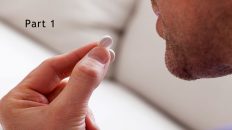By Jerry Morris, PsyD, MsPharm, MBA
MB (Marc Braman, MD, MPH):
So essentially, every single one of us by default from birth, essentially potentially has ADD, or bipolar disorder, or major depression, and its simply a matter of our growth and development that gets us past that, that gets us to a healthy functional place?
JM (Jerry Morris, PsyD, MSPharm, MBA):
Sure. Now, granted some of us have more potential than others, based on our genetics. Just like some of us who have the genetics to be 6 foot 9 inches tall have more potential to be a college basketball player. But, most people who are 6’9″ don’t become college basketball players.
MB:
Right. So as we go forward with our other sessions, it needs to be in this framework that the action is here in the frontal lobes behind the forehead, and that everything we talk about, everything we do, is relative to helping that part of the brain develop and function better. And there’s not going to be any… There’s no magic bullets. There’s no Ritalin that’s going to magically fix that frontal part of the brain. It’s going to be a matter of growing it.
JM:
That’s exactly right. There’s no simple psychological technique, there’s no medicine, there’s no nutritional factor we can put in by itself, there’s no exercise program. It’s a complex multi-pathway job and disorder. And the key is this too. Remember, we don’t want to do all the heavy lifting as parents, or as doctors. We have school teachers. And think about it, when you look at the training and curriculum of school teachers, they’re all taught to help refine and grow decision making, executive functions, behavioral management, relational management, courtesies and socialization. All these are frontal lobe choices and neuron growth. If you look at churches, they’re all trying to focus on those same kind of skills to mature the individual and get them to higher-order skills and concepts like love and trust and spirituality and those things. If you look at a neighborhood, guess why the neighborhood mows its lawns. Guess why the neighborhood paints its houses. Guess why the neighborhood tries to wave and say hi to neighbors. They’re trying to build these frontal lobe functions to refine choices and behavior, and care about relationships and balancing the impact and interest in relationships.
MB:
Excellent. We will look forward to getting into this further and understanding what causes it and what we can do for ADD with lifestyle medicine. Thank you, Dr. Morris.
JM:
You’re welcome, Marc.
Environmental adversity and increasing genetic risk for externalizing disorders. Hicks BM, South SC, Dirago AC, Iacono WG, McGue M. Arch Gen Psychiatry. 2009 Jun;66(6):640-8. doi: 10.1001/archgenpsychiatry.2008.554.
Predicting adult physical illness from infant attachment: a prospective longitudinal study. Puig J, Englund MM, Simpson JA, Collins WA. Health Psychol. 2013 Apr;32(4):409-17. doi: 10.1037/a0028889.
Behavioral genetics and child temperament. Saudino KJ. J Dev Behav Pediatr. 2005 Jun;26(3):214-23. Review.





